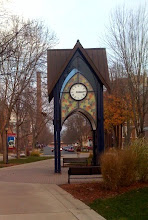
The Guardian, March, 28, 2009
White, blue-eyed bankers are entirely to blame for the world financial crisis that has ended up hitting black and indigenous people disproportionately, the president of Brazil declared .
In an outspoken intervention as Gordon Brown stood alongside him, Luiz Inacio "Lula" da Silva pledged to make next week's G20 summit "spicy" as he accused the rich of forcing the poor into greater hardship.
"This crisis was caused by no black man or woman or by no indigenous person or by no poor person," Lula said after talks with the prime minister in Brasilia to discuss next week's G20 summit in London.
"This crisis was fostered and boosted by irrational behaviour of some people that are white, blue-eyed. Before the crisis they looked like they knew everything about economics, and they have demonstrated they know nothing about economics."
Challenged about his claims, Lula responded: "I only record what I see in the press. I am not acquainted with a single black banker."
The remarks by Lula, a former trade union leader who had an impoverished upbringing in the poor north-east of Brazil, enlivened Brown's five-day trip to North and South America. This is designed to pave the way for a global agreement on how to tackle the global downturn at next week's G20 summit in London, to be chaired by Brown.
The prime minister travelled to Brazil, the world's 10th largest economy, to talk up his latest initiative to stimulate world trade. Brown wants to win agreement at next week's summit for a new $100bn global fund to increase credit flows.
Lula lavished praise on Brown for always rallying to the help of Brazil as he made clear that he accepts many of the prime minister's interventionist ideas for stimulating global growth. But as they stood in the formal entrance to the president's palace, Brown had to watch as the pugilistic former trade union leader embarked on one of his familiar tirades.
Lula said world leaders had to be prepared for a political fight to ensure no repeat of what Brown called the global financial "power cut". "This meeting in London has to be a bit spicy because there has got to be a political debate," said Lula. "I want a London consensus."
The president indicated that he is uneasy about the US, which has been arguing that the most important measure to take is a further co-ordinated global fiscal stimulus. Lula used a colourful analogy to illustrate his demand for tougher regulation of financial markets.
"We do not have the right to allow this crisis to continue for long. We are determined to make sure the world financial system is vigorously regulated. You go to a shopping mall and you are filmed. You go to the airport and you are watched. I can't imagine that only the financial system has no surveillance at all."
The president then turned his fire on the media for demonising immigrants: "The great majority of the poor are still not getting their share of the development that was caused by globalisation. They are the first victims. I follow the press and I see that prejudice is a factor against immigrants in the most developed countries."
The behaviour of developed countries contrasted badly, he added, with Brazil, which is a member of the "Bric" group of emerging economies – Brazil, Russia, India and China. "Here in Brazil, on the contrary, we have made the decision to permanently regulate thousands of Bolivians who were undocumented. We can't put on their shoulder the responsibility for the crisis caused by very few people."
Brown looked mildly uncomfortable during Lula's outburst. He had hoped that their joint press conference would be dominated by his announcement that he will table plans at next week's G20 summit in London for a new $100bn fund of credit guarantees to boost world trade.
The prime minister said: "The newest fallout from this banking crisis that has hit the world is the reduction in trade. Chinese exports are down 25%, Germany's exports are down 20%, Japan's exports are down more than 40%. So we have to act on trade as we are acting on banking reform and on economic growth.
"At the G20 next week we will debate further measures. Ninety per cent of all world trade is financed by credit. Credit has dried up dramatically in recent months, it has increased the costs of trade for businesses in every country. The international community cannot stand aside."


